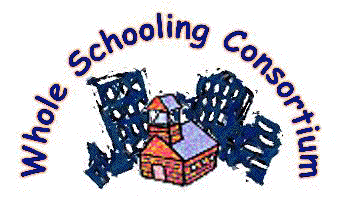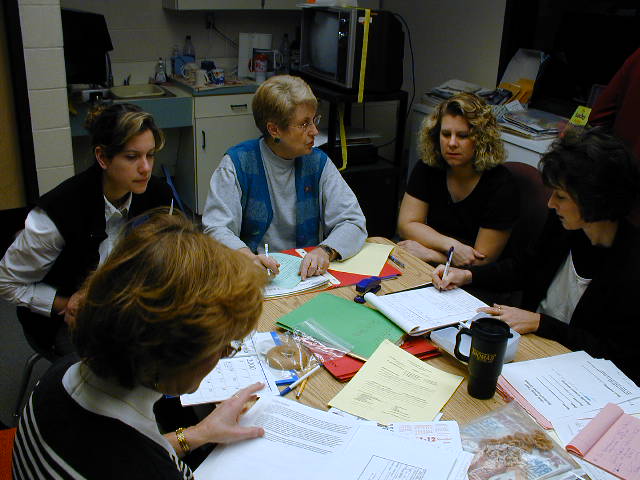

Support in learning is needed by teachers and children alike and schools use specialized school and community resources (special education, title I, gifted education) to strengthen the general education classroom. Support personnel collaborate with the general education instructor to include children with special needs in classroom activities and to design effective instruction for all students. They avoid ability grouping or teaching children at the back or side of the room. All struggle to provide proactive supports to meet needs of students with behavioral challenges.Links. Publications.

COLLABORATION AND SUPPORT FOR LEARNING:
Strengthening the middle and avoiding the tragedy of the commons.
If schools are
to be successful, a professional community of support among teachers is necessary
as well. Typically, teaching is an isolated and isolating profession.
This is particularly problematic when teachers are dealing with children
with many life challenges. If teachers do not have support in the class,
forums
for dialogue, communication, sharing, and problem-solving, it is all too
easy for
frustrations to develop and students with high needs to become targets (Evans,
Lunt, Wedell & Dyson, 1999; Idol, 1997; Walther-Thomas, Korinek, McLaughlin
and Willaims, 2000). In many urban schools, as is the case in most schools
in the Detroit area, specialized resources are used for special classes and
schools
or pull-out resources rooms, further isolating students and providing general
education teachers little help and assistance, thus contributing to problematic
dynamics discussed above (Detroit Public Schools, 2002).
In a school committed to high levels of learning for all students, research
has shown that specialists and support staff develop an effective, collaborative,
trans-disciplinary support system for teachers, students, and families. Such
schools use specialized school and community resources (special education,
title
I, gifted education) to strengthen the general education classroom, developing
support teams to assist with academic, social, and medical needs (Evans,
Lunt, Wedell & Dyson, 1999; Idol, 1997; Walther-Thomas, Korinek, McLaughlin
and Willaims, 2000).
Supporting teachers in working with students at multiple ability levels, who have emotional and social challenges in their lives is critical. This is particularly important as the shift towards building an inclusive culture in the school is occurring. Teachers who are used to trying to teach at only one level have difficulty figuring out how to teach at multiple levels. Even teachers who do this well sometimes don’t know that they do or what is multi-level and what is not.
A range of specialists
are available to most schools to deal with special
needs and problems of children – social workers, special education
teachers, bilingual teachers, psychologists, nurses, occupational therapists,
speech
therapists, and others. In a traditional school, most of these people work
on their own with
limited consultation with others and pull children out of class for various
services.
In an effective school, however, specialists work to support the general
education classroom teacher. Further they work as a team.
Special education teachers play an important role in an inclusive school.
How this role develops, however, can vary dramatically depending upon
philosophy and purpose. Four roles are emerging out of research related
to in-class
special
education support by teachers and aides.
1. Remediation or enrichment – the goal is to ‘fix’ the child or ‘enrich’ the child’s experience, often in pull-out classes or one on one work in the back of the general education class;
2. Adapting – teaching strategies are not questioned and if the ability of the child does not match requirements, curriculum adaptations are developed – eg. different worksheets, less work, more time to do work.
3. Inclusive, multi-level, authentic teaching. Here the support teacher and general education teacher work together to design lessons that engage children at multiple levels.
4. Teacher need. In this situation, a support teacher provides assistance to the teacher in strengthening or areas of relative need in the teacher’s repertoire. This might include helping the teacher to learn skills in literacy, science by developing a lesson and teaching it.
In quality schools, we put our focus on #’s 3 and 4 -multilevel teaching. #, pull-out remediation and enrichment has little place. Adapting (#2)will be needed less as teachers learn how to teach starting from children’s present abilities and strengths. In this way of working we might see:
We would NOT see.
Michael Peterson, 2005
Dettmer, P. Dyck, N. & Thurston, L. (1999). Boston: Allyn and Bacon.
Evans, J., Lunt, I., Wedell, K & Dyson, A. (1999). Collaborating for effectiveness: Empowering schools to be inclusive. Philadelphia: Open University Press.
Friend, M. & Cook, L. (1996). Interactions: Collaboration skills for school professionals. White Plains, New York: Longman.
Idol, L. (1997). Creating collaborative and inclusive schools. Austin, Texas: Eitel Press.
Snell, M. & Janney, R. (2000). Collaborative teaming. Baltimore, Maryland: Paul H. Brookes.
Walther-Thomas, C. (2000). Collaboration for inclusive education. Boston: Allyn and Bacon.